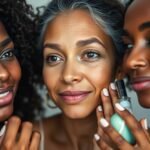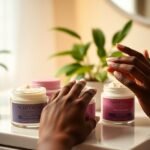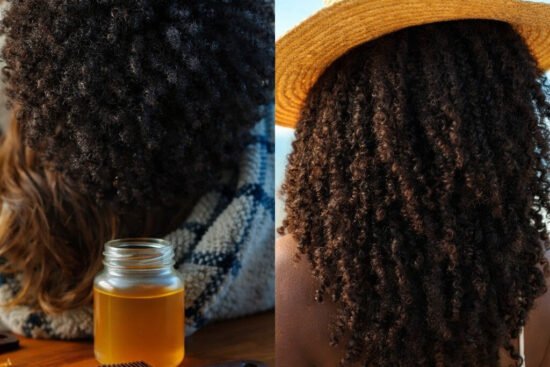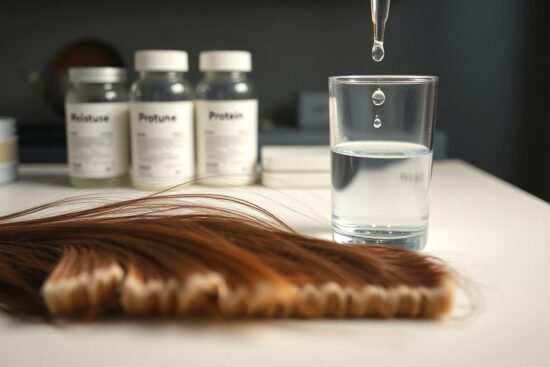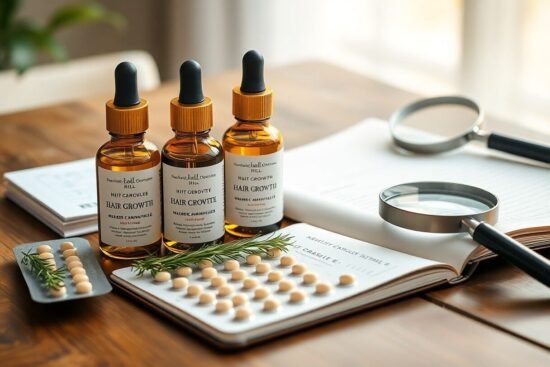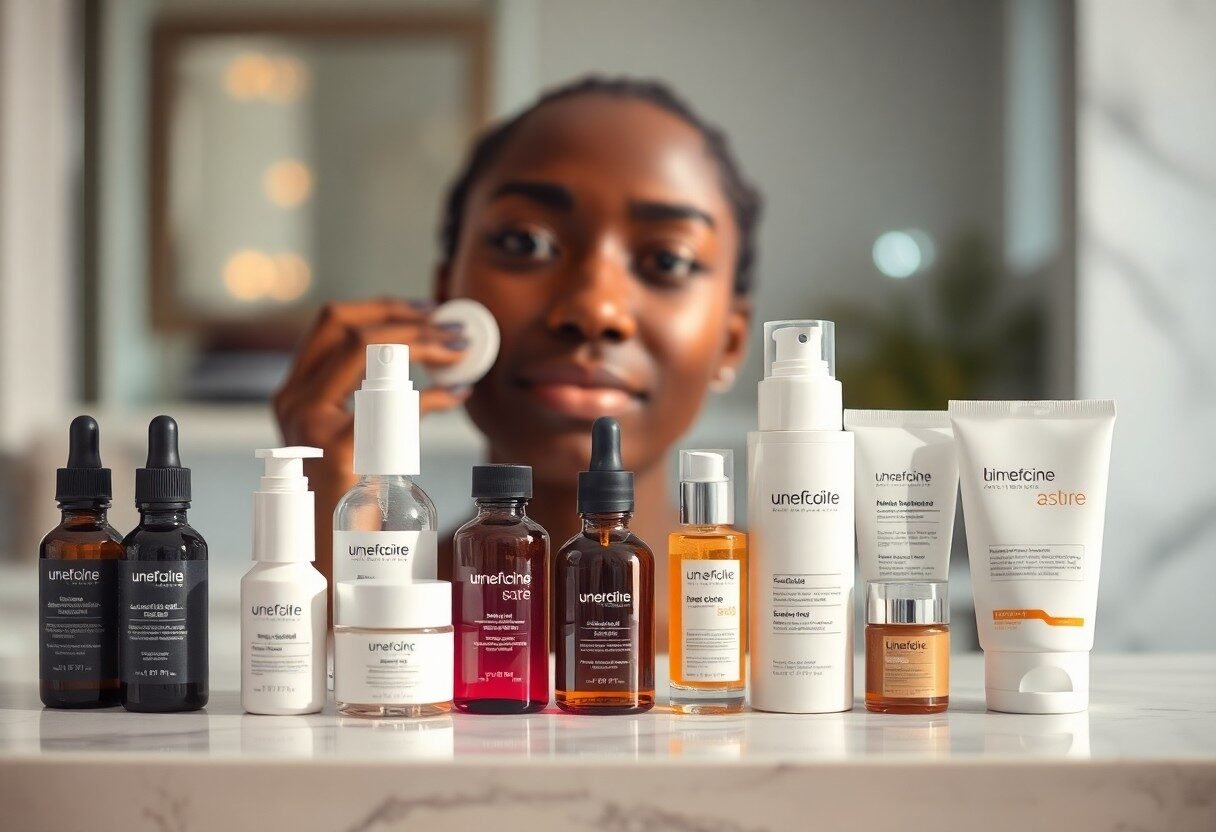
Many individuals with darker skin tones often face unique skincare challenges, which can make finding the right products a daunting task. I want to share my knowledge about holy grail skincare products that enhance radiance while addressing common issues such as hyperpigmentation and dryness. You deserve to have a routine that not only nourishes your skin but also highlights your natural beauty. With the right products in your arsenal, you can achieve a glowing complexion and boost your confidence. Let’s probe the vitals that can transform your skincare game.
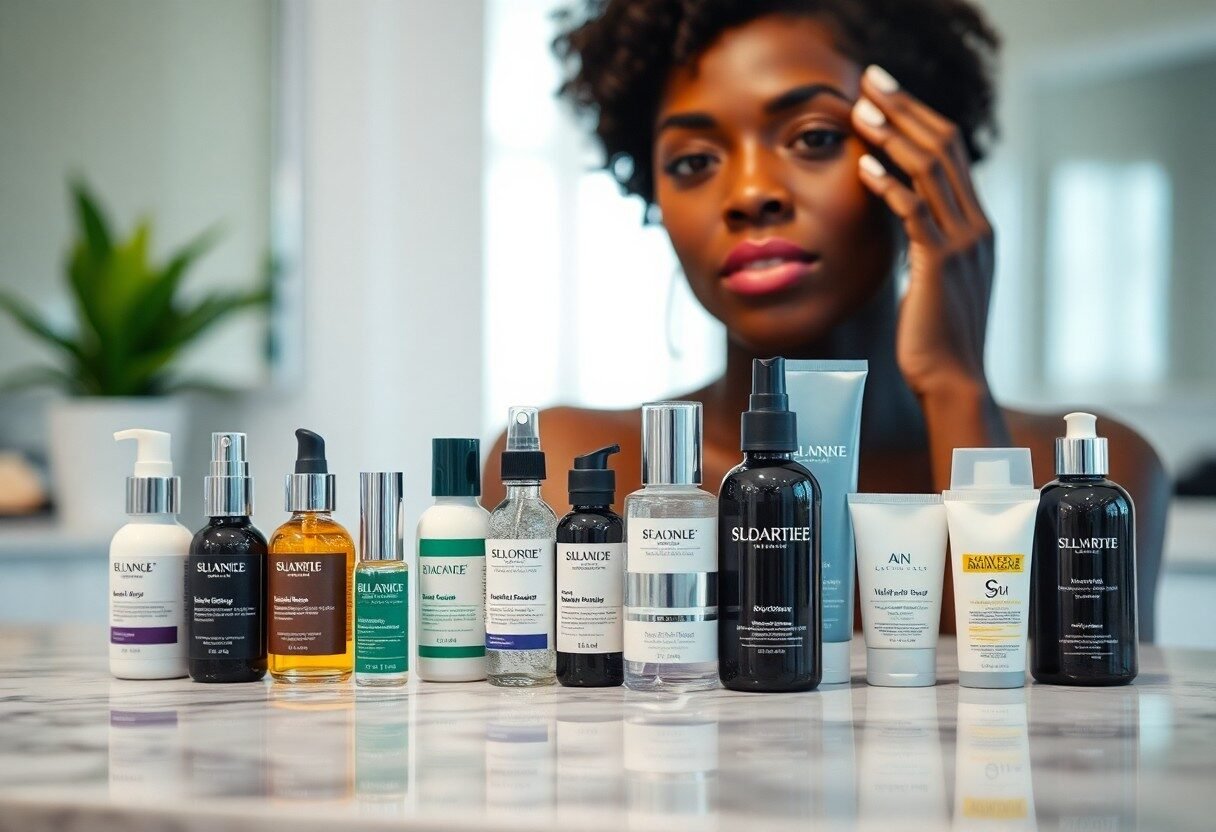
Key Takeaways:
- Look for products that focus on hydration and moisture retention, as darker skin tones can be prone to dryness.
- Consider products with ingredients like vitamin C, which helps to brighten the skin and even out skin tone.
- Choose sunscreens that provide broad-spectrum protection, as UV rays can affect darker skin and lead to pigmentation issues.
- Incorporate products with natural oils, such as jojoba or argan oil, which can nourish and enhance the skin’s barrier.
- Be cautious with exfoliation; opt for gentle exfoliants to avoid irritation and maintain the skin’s natural glow.
- Seek out means of addressing hyperpigmentation, such as serums with niacinamide or kojic acid.
- Always patch-test new products to ensure compatibility and avoid adverse reactions.
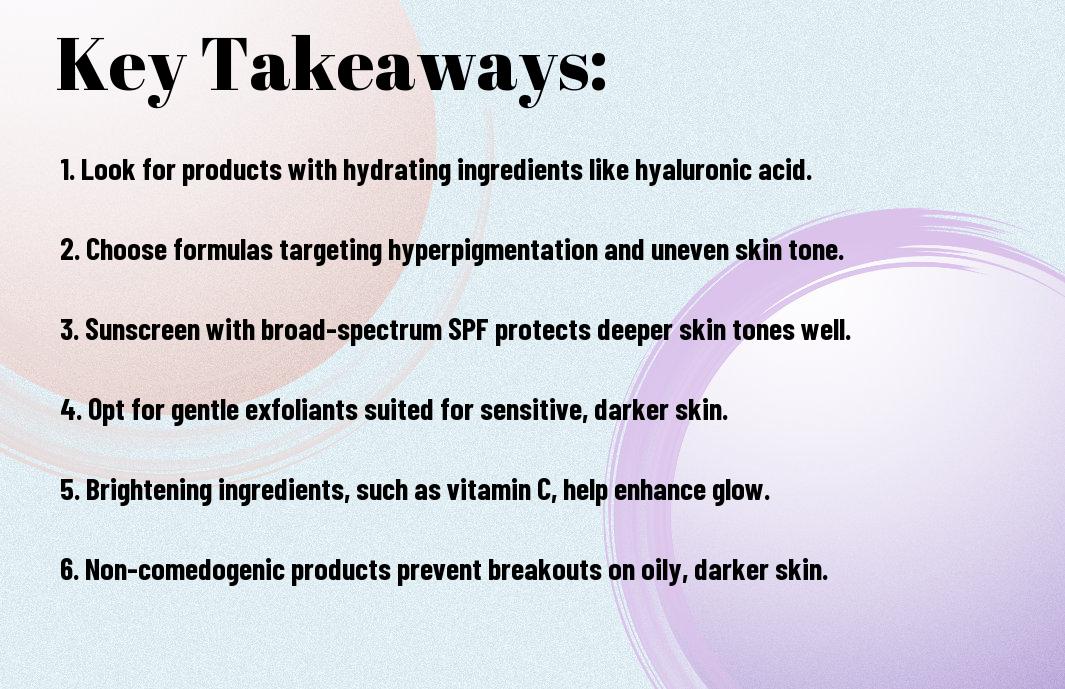
The Unique Needs of Darker Skin Tones
Misconceptions About Skincare for Darker Skin
A common misconception is that darker skin tones don’t require as much moisture as lighter skin. Many assume that melanin provides sufficient hydration, but in reality, darker skin can struggle with dryness and lack of glow. This myth can lead individuals to skip important moisturizers or heavy oils, resulting in a dull complexion or even increased sensitivity. It’s time to debunk the idea that darker skin is inherently less needy when it comes to hydration and nourishment.
Common Skin Concerns for Deeper Complexions
Darker skin tones often face specific challenges, including hyperpigmentation, acne scars, and uneven skin texture. These concerns are exacerbated by a lack of visibility in many mainstream skincare products, which may not address the unique structure and needs of deeper complexions. The focus can sometimes lean towards achieving a flawless look rather than understanding how to maintain healthy skin.
Hyperpigmentation is incredibly prevalent in individuals with deeper skin tones, often resulting from post-inflammatory hyperpigmentation due to acne or irritation. Statistics show that up to 70% of people with darker skin experience this issue. Furthermore, conditions like eczema and keloids can also present differently on darker skin, potentially leading to misdiagnoses or ineffective treatments. Because of the high melanin content, certain treatments that work for lighter skin can aggravate rather than alleviate these issues, making it important to choose products formulated specifically with darker skin in mind.
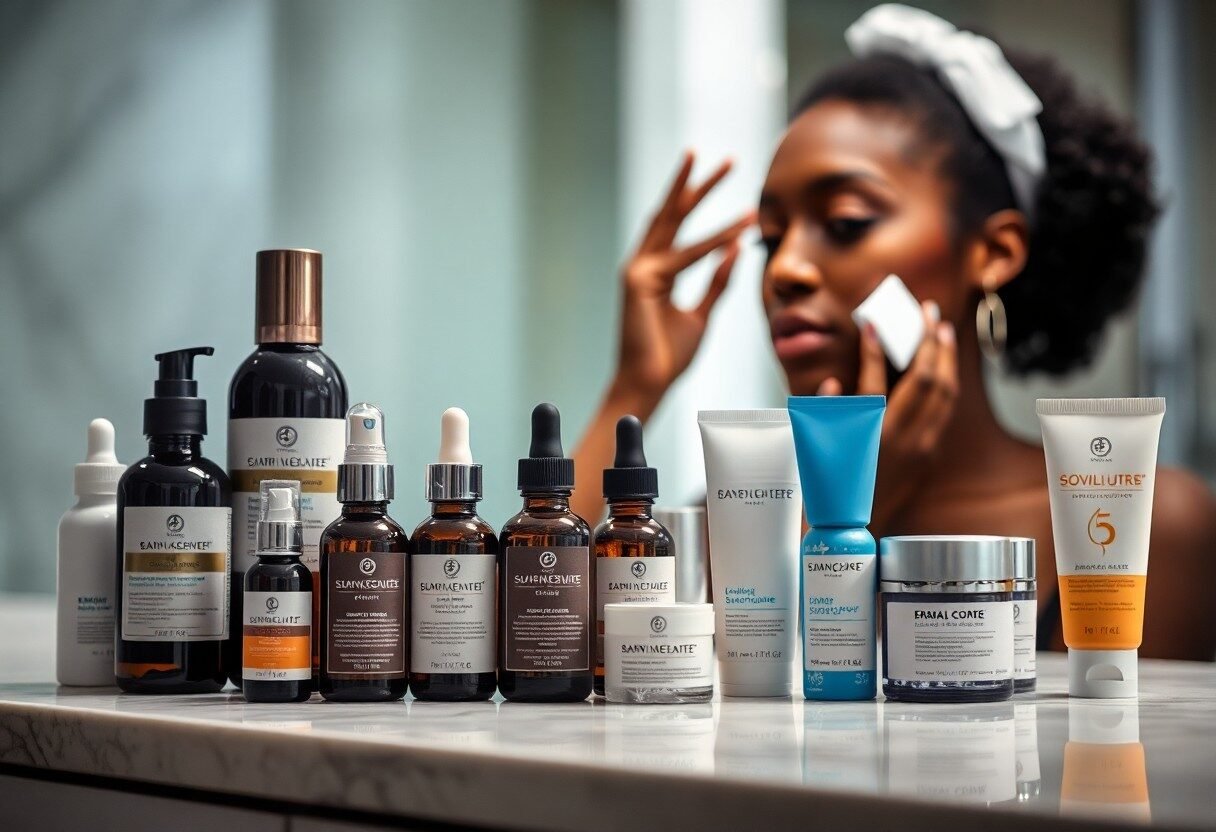
Essential Ingredients That Make a Difference
The Importance of Hydroquinone and Kojic Acid
Hydroquinone and kojic acid are standout ingredients in the quest for an even skin tone. Hydroquinone works to lighten dark spots by inhibiting melanin production, resulting in a brightened complexion. Kojic acid, derived from mushrooms, offers similar benefits while boasting additional antioxidant properties. Using products with these ingredients can significantly enhance your skin’s clarity, making them must-haves in your skincare arsenal.
The Power of Antioxidants: Vitamin C and E
Vitamin C and E are celebrated for their ability to combat oxidative stress and improve skin health. Vitamin C is known for brightening the complexion and reducing hyperpigmentation, while Vitamin E helps to hydrate and protect the skin from environmental damage. Together, they create a potent combination that not only enhances your skin’s radiance but also promotes overall vitality.
Integrating Vitamin C and E into your routine can transform your skincare game. Vitamin C, in particular, provides a more even skin tone by blocking melanin production, making it a valuable ally for those dealing with dark spots. Look for serums that combine both vitamins for an amplified effect; the synergy between these antioxidants not only helps fight free radicals but also nurtures and rejuvenates your skin from within. With consistent use, you may notice a significant reduction in dark spots and an overall brighter, more youthful appearance.
Recommended Holy Grail Products for Everyday Use
Daily Moisturizers That Deliver Results
For daily hydration, I highly recommend looking for moisturizers that include hyaluronic acid and shea butter. These two ingredients work wonders for providing intense moisture while preventing moisture loss. Brands like CeraVe and Neutrogena offer formulations specifically designed for darker skin tones that not only hydrate but also improve skin barrier function. Choosing a lightweight, non-greasy moisturizer can help you maintain a dewy complexion without causing breakouts.
Sunscreens Designed for Darker Skin
Protecting your skin from UV damage is vital, and thankfully, there are sunscreens tailored for darker skin that won’t leave a white cast. Look for broad-spectrum formulations with a minimum SPF 30 that are lightweight and absorb quickly. Chemical sunscreens often work well, as they are less likely to leave a residue. Brands like Black Girl Sunscreen and Supergoop! offer great options that seamlessly blend into your skin while providing effective protection against harmful rays.
Finding the right sunscreen can be a game changer for your skincare routine. For instance, Black Girl Sunscreen is designed specifically with darker skin in mind, ensuring that it not only protects against UV rays but also enhances your natural glow without ashy residue. Supergoop! has also formulated sunscreens that offer a sheer finish, so you can reap the benefits of sun protection without compromising your aesthetic. Plus, using a sunscreen that suits your skin tone encourages daily application, providing consistent protection against skin damage and premature aging.
The Role of Exfoliants and Their Impact
Chemical vs. Physical Exfoliants: What to Choose
Choosing between chemical and physical exfoliants often depends on your skin’s unique needs. Chemical exfoliants, like alpha-hydroxy acids (AHAs) or beta-hydroxy acids (BHAs), work by dissolving dead skin cells and enhancing cell turnover without causing irritation. They are particularly beneficial for those with darker skin as they reduce the risk of hyperpigmentation. On the other hand, physical exfoliants use granules or scrubs to manually buff away dead skin. While they can be effective, caution is needed to prevent microtears and irritation, especially on sensitive skin.
Top Exfoliating Products for Radiant Skin
To achieve that coveted glow, incorporating the right exfoliating products into your routine is imperative. Some go-to options include Paula’s Choice Skin Perfecting 2% BHA Liquid Exfoliant, which penetrates pores effectively, and Drunk Elephant T.L.C. Sukari Babyfacial, containing both AHA and BHA for comprehensive exfoliation. For a gentler touch, I often recommend First Aid Beauty Facial Radiance Polish, which uses both physical and chemical exfoliants to brighten and smooth without harshness.
Having tried various options, I can stand by the effectiveness of these products in revealing smoother, brighter skin. The Paula’s Choice formulation is particularly impressive for its ability to clear pores while reducing redness and preventing breakouts, while the Drunk Elephant Babyfacial offers a salon-like experience at home, significantly reducing the appearance of dark spots. The blend of exfoliants in First Aid Beauty’s polish ensures that even the most sensitive skin types get the care they need without irritation, making it great for darker tones prone to hyperpigmentation. Together, these products can help you achieve radiant skin that feels healthy and looks vibrant.
Creating a Skincare Routine That Works
Morning vs. Evening Care: A Tailored Approach
Your morning skincare routine sets the tone for the day, aiming to protect your skin from environmental stressors. A lightweight moisturizer with SPF is necessary to prevent sun damage, particularly for darker skin that’s more susceptible to hyperpigmentation. In the evening, focus shifts to repair and regeneration with richer, hydrating products that nourish your skin overnight, like a nourishing serum infused with antioxidants or peptides.
Timing and Order: The Secret to Efficacy
The sequence of applying skincare products significantly influences their effectiveness. Starting with a gentle cleanser removes impurities without stripping moisture, paving the way for deeper penetration of subsequent products. For morning routines, follow with a toner or essence to balance and prep the skin, followed by your serums and finally, a moisturizer. In the evening, adopting a similar layering method ensures that active ingredients work harmoniously to replenish and repair your skin overnight.
When layering products, I often stress the impact of timing. For instance, applying a vitamin C serum before your moisturizer in the morning boosts protection against free radicals and enhances your glow. In the evening, using retinol before a thick cream helps stimulate collagen production and cell turnover, addressing concerns like uneven tone or dark spots. Ensuring each layer is fully absorbed before adding the next maximizes the benefits—typically allowing a minute or so between products can help achieve this, creating a rhythm that enhances your skin’s receptivity and overall health.
The Influence of Lifestyle on Skincare
Nutrition’s Role in Maintaining Skin Health
Your diet significantly impacts your skin’s appearance and health. Consuming a balance of fruits, vegetables, and healthy fats can provide important vitamins and antioxidants, combating free radicals that damage skin cells. Nutrients like vitamins C and E, along with omega-3 fatty acids, contribute to a more radiant complexion. Including foods high in zinc and biotin can also help improve skin elasticity and hydration, important for maintaining the skin’s natural barrier, especially for darker skin tones prone to dryness.
The Connection Between Stress and Skin Conditions
High-stress levels can lead to skin flare-ups and exacerbate existing conditions. When you experience stress, your body produces cortisol, which can trigger increased oil production, leading to breakouts. Stress is also linked to conditions like eczema and psoriasis, making it important to manage your mental well-being to support skin health.
In fact, prolonged stress can lead to chronic inflammation, making your skin react more violently to environmental irritants. I’ve noticed that times of heightened stress in my life resulted in uninvited blemishes and increased sensitivity. Practices such as meditation, regular exercise, and adequate sleep can significantly improve not only your mood but also the state of your skin. You may find that a little bit of relaxation leads to a noticeable glow in your complexion.
Debunking Skincare Myths for Darker Complexions
Myths Surrounding Skin Tone and Aging
Many believe that darker skin tones age slower than lighter ones, attributing this notion to higher melanin levels as a natural barrier against UV damage. However, this is a simplification. While darker skin often has better protection against sun-induced aging, it is still susceptible to issues like hyperpigmentation and loss of elasticity. Sun protection is vital for everyone, regardless of skin tone, and neglecting this fundamental step can lead to premature aging signs.
Fact-Checking Popular Skincare Hacks
Social media is rife with skincare hacks, but not every viral tip is effective or safe, especially for darker skin tones. For example, using lemon juice as a natural brightening agent can cause severe irritation and irritation, leading to inflammation or even pigmentation issues, instead of the sought-after glow.
On platforms like TikTok and Instagram, hacks such as using toothpaste for acne treatment often get traction without proper evidence. Relying on potentially harmful practices can exacerbate your skincare problems. Instead, focus on proven ingredients like salicylic acid or niacinamide for blemishes. Always look for advice rooted in dermatological research or validated by professionals for your specific skin type, particularly when dealing with darker complexions, which have unique sensitivities.
Seeking Professional Help When Needed
Recognizing When to Consult a Dermatologist
If persistent skin issues arise despite your best efforts, it’s time to seek professional guidance. Signs such as severe acne, hyperpigmentation that doesn’t respond to treatment, or skin irritation necessitate a visit to a dermatologist. They can help identify underlying conditions and provide tailored treatments, ensuring that your skin receives the best possible care.
The Benefits of Customized Skincare Plans
A customized skincare plan takes the guesswork out of your routine by addressing your unique skin needs and concerns. Dermatologists can create a regimen based on your skin type, history, and individual goals, offering targeted solutions that over-the-counter products often lack. This tailored approach can lead to more effective results and improved confidence in your skin.
For example, a dermatologist might suggest prescription-strength retinoids for acne-prone skin or specialized treatments for hyperpigmentation, considering your skin tone and its sensitivities. This personalized care not only enhances the effectiveness of products but can also prevent adverse reactions, making your skincare journey smoother and more successful. With a plan specifically designed for you, achieving your skincare goals becomes much more attainable, reducing frustration and promoting healthier skin over time.
Summing up
Presently, as I navigate the world of skincare for darker skin tones, I can confidently say that finding the right products can transform your routine. You deserve formulations that cater to your unique needs, focusing on hydration, even skin tone, and protection from dark spots. Whether it’s a nourishing moisturizer or a potent serum, I encourage you to explore these ‘holy grail’ products that truly make a difference. Investing in your skincare is an empowering journey towards radiant skin, and you have the tools to achieve it.
FAQ
Q: What are Holy Grail skincare products for darker skin tones?
A: Holy Grail skincare products refer to those highly effective and widely recommended products that cater specifically to the unique needs of darker skin tones. These products often address concerns such as hyperpigmentation, uneven texture, and dryness, providing moisturizing benefits while enhancing skin radiance. Ingredients like vitamin C, niacinamide, and shea butter are commonly included in these formulations.
Q: How do I choose the right moisturizer for darker skin tones?
A: When deciding on a moisturizer, look for rich, hydrating ingredients such as ceramides, glycerin, or oils like jojoba and argan. These components help lock in moisture and maintain a healthy skin barrier. Additionally, opt for products that are non-comedogenic to prevent clogged pores, which can be a concern for those with darker skin.
Q: Is sunscreen important for darker skin tones?
A: Yes! Sunscreen is imperative for all skin tones, including darker ones. While darker skin has higher melanin content, which offers some natural protection against UV rays, it is still vulnerable to sun damage and skin cancer. A broad-spectrum sunscreen with an SPF of 30 or higher is recommended to help prevent skin issues like hyperpigmentation and premature aging.
Q: What ingredients should I look for to combat hyperpigmentation?
A: To fight hyperpigmentation effectively, consider products that contain ingredients like hydroquinone, azelaic acid, kojic acid, vitamin C, and niacinamide. These components can help brighten dark spots and promote an even skin tone. It’s imperative to incorporate these ingredients gradually into your routine to avoid irritation.
Q: Are there specific products recommended for oily skin in darker complexions?
A: For oily skin in darker complexions, lightweight, oil-free gel moisturizers and clarifying serums can be beneficial. Look for products containing salicylic acid or tea tree oil, which help control excess oil without drying the skin. Choosing non-comedogenic products is also important to avoid breakouts while maintaining hydration.
Q: How often should I exfoliate my skin?
A: Exfoliating helps remove dead skin cells and can improve texture and brightness. For those with darker skin tones, it is generally recommended to exfoliate 1-2 times a week, using gentle exfoliants like chemical exfoliants (AHA or BHA) instead of harsh physical scrubs. This method reduces the risk of irritation and helps manage hyperpigmentation.
Q: Can I use anti-aging products if I have darker skin?
A: Absolutely! Many anti-aging products are safe and effective for darker skin tones. Look for formulations that include retinol, peptides, and antioxidants like vitamin E. These ingredients can help improve skin elasticity and minimize fine lines without causing excessive irritation or discoloration.
